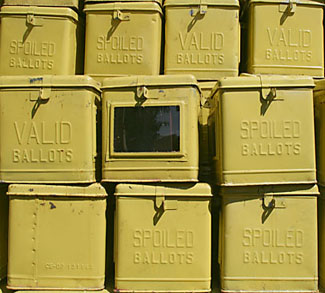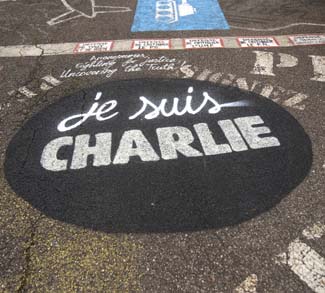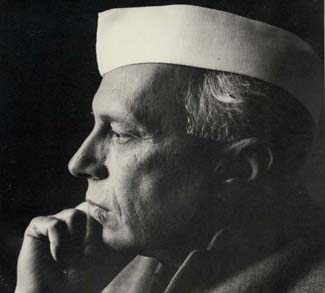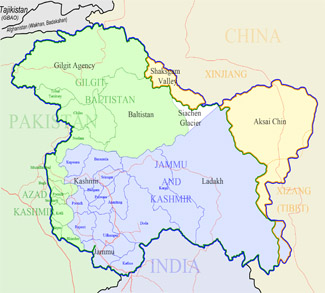After the implosion of the Soviet Union the day after Christmas in 1991, there was a wide recognition among many analyst-prognosticators of international trends that the flowering of liberal democracy was the global wave of the future. (Liberal democracy characterized by values such as freedom of expression, religion, and speech as well as separation of civilian-run government from the military.) Roughly three months shy of the decade anniversary after the Soviet collapse, the 9/11 terror attacks dramatically reversed whatever democratic trends there were in the 1990s – admittedly a decade full of civil wars and ethnic cleansings in various regions throughout the planet. New security strategies and policies were enacted in the West, especially in the United States, telling examples being the consolidation of security agencies into the Department of Homeland Security (DHS), intrusive search practices implemented by the Transportation Security Administration (TSA), and the clandestine National Security Agency (NSA) dragnet surveillance program PRISM.
This trend in militarization of domestic policing – and establishing its accompanying security economy – has been analyzed by many in the past 15 years. The late French social theorist Michel Foucault noted a certain phenomenon he called the ‘boomerang effect’ where various state doctrines and technologies experimented abroad in context of war or colonial administration were oftentimes implemented domestically later and then globalized. A recent example of this is the use of the Simera, a balloon-based aerial surveillance technology developed by Logos Technologies for the US forces engaging in the wars in Afghanistan and in Iraq, during the 2016 Rio Olympic Games. Meanwhile the French government has renewed the state of emergency after the Nice attack (July 14), extending it for another six months into January 2017, which has pointed out by the Human Rights Watch (HRW) as having some potential for abuse against rule of law and civil liberties if implemented with unaccountability by the national executive.
Needless to point out that this post-9/11 trend of executive expansion hasn’t been contained just among the so-called ‘Western’ states. The 9/11 terror blasted a shockwave that reverberated throughout the world, altering security and legal structures in many states, both Western and non-Western. The shock was geopolitically capitalized by the totalitarian government of the People’s Republic of China, which has been resisting liberal democratic principles in the name of ‘civilizational diversity.’ Beijing used the incident as a pretext to crack down on its independence-minded Uighur Muslim populations in its western periphery. This issue surrounding Islamic extremism in East Turkestan/Xinjiang Uyghur Autonomous Region has taken a new dimension not only with activities of al Qaeda but also with the rise of the terror organization Islamic State (IS). The current climate has the potential for not only recruitments and inspiring the formation of new terror networks, but also even secessionist Islamist statelets.
Political systems are complex, especially ones like liberal democracy where the mass population is involved in governance.
Alexander Cooley, director of Columbia University’s Harriman Institute, has extensively noted that Non-Governmental Organizations (NGOs) – particularly those that work to promote liberal democracy and counter election corruptions – have also come under suppression by various states around the world as extensions of foreign powers (whether those accusations are legit or not will not be made the issue here), in attempt by those states to preserve sovereignty and prevent meddling in its domestic affairs.
While the illiberal regimes attempting to preserve its legitimacy isn’t surprising – and is rather expected – it’s pressing to note that this growth of cracks in the principles of liberal democracy in the West is not limited to post-crisis state policies and legal enactments, but also within the minds of the general national citizenry.
The July 2016 issue of the Journal of Democracy, an internationally-recognized academic quarterly specializing in the analysis of the state of democracy around the globe, ran a sobering article concerning some degrading trends of liberal democratic principles in the West.
According to an analytical piece written by Roberto Foa and Yascha Mounk entitled The Danger of Deconsolidation, basing their analysis on data compiled by The World Values Survey (WVS) between 1995 and 2014, there are several trends to be concerned about if the principle of liberal democracy is to be passed down in the coming decades, noting that citizens have not only become more critical of their politicians, but also that of liberal democratic system itself:
- There is significantly less emphasis given to importance of living in a liberal democratic state, especially by those born after 1980. Devotion that we saw in the past generation to democratic principle is less strong. According to Foa and Mounk, support for freedom of speech has decreased as well. (One comes to mind the internationalization of the “Hate speech laws” in recent decades, whereas the Western states used to see free expression as a human right, according to Jacob Machangama, a lecturer on international human rights at the University of Copenhagen).
- Emphasis on key civil rights and values, as well as idea of using liberal democratic institutions to implement social change (civic engagement), have gone cold, on both sides of the North Atlantic. Although civil protests and boycotts still abound, these have generally declined overall as well.
- Emphasis on importance of free and fair elections has waned in the West, especially among those born after 1980. Foa and Mounk note that this is opposite of what can be observed in other parts of the world such as China, India, and the MENA regions.
- This item is directly linked to our above discussion in the context of post-9/11 political-security trends: Foa and Mounk note that there is a rise in support for illiberal, authoritarian military regime systems, also with those born after 1980. Even those populations with wealth have become increasingly supportive of instituting military rule if the government functions with incompetence. They comment that the “rising support for illiberal politics is driven not only by the disempowered, middle-aged, and the underemployed. Its vocal supporters can also be found among the young, wealthy, and privileged.”
Even a quick view of the US presidential election climate of the past year suggests that there have been a “radicalization” of the strategies, policies and methods used by various candidates to secure victory for the White House. From the populist camp (from ever-controversial fire-breathing Trump to unabashedly socialist Sanders) to the establishment camp (Clinton, who essentially had fixed victory with the Democratic National Convention), the entire process has been described as the no-holds barred “ugliest election” in modern American history. This also can be extended to attitudes and actions taken by general public supporters and critics of the various candidates, starting with legitimization of violent anti-Trump protests by an editor at the left-leaning media outlet Vox (who was subsequently suspended). Meanwhile, violence that we have witnessed at Trump rallies by Trump supporters should be condemned as well. There also was series of intense protests against Clinton by the pro-Sanders faction after the fixed nature of the Clinton victory at the Democratic National Convention came to light.
We seem to be witnessing a lack of the stability that is usually associated with liberal democracy, at least what has been promoted through civics textbooks. It is often explained that this trend rises from distrust of traditional and establishment democratic institutions to the politicians who control them, leading to support of non-typical establishment candidates who would hopefully reform the system for the better. Results of the research by Foa and Mounk suggest that there is something of a deeper undercurrent of cynicism and suspicion against liberal democratic process itself, unable to deliver what various constituents want, brewing underneath the chaos we have been witnessing more recently.
Political systems are complex, especially ones like liberal democracy where the mass population is involved in governance. It is dependent on varying internal factors of the states implementing it. Democracy is far from the perfect system it often is portrayed to be, and unfortunately may not necessarily be best for preserving stability for every demographic around the world, especially when the state in question has high tensions with multi-ethnic or multi-religious sub-groups. It should not be forgotten that it has enabled monsters to grab the levers of national power (think of the rise of Adolph Hitler).
Democracy is messy. It requires a competent, functioning civil society before polling sites can be opened, a harsh lesson that many of us saw after the 2003 Iraq War. Meanwhile, liberal democratic principles have in many instances allowed for fuller human individual potential to be unleashed, with free market of ideas and civil institutions available to be adopted by the general public without state coercion in many cases. If the policies and ideas are debated with rigor according to this free market of ideas, instead of the simple whim of the governing figures or sound bites issued from demagogues (either those of Right or Left), it may potentially prevent short-sighted policies from damaging domestic societies even when implemented with the best of intentions. If we intend to have liberal democratic principles passed along to coming decades, warnings issued by Foa and Mounk on the rise of illiberalism in the West should not be ignored.
The opinions, beliefs, and viewpoints expressed by the authors are theirs alone and don’t reflect any official position of Geopoliticalmonitor.com.




